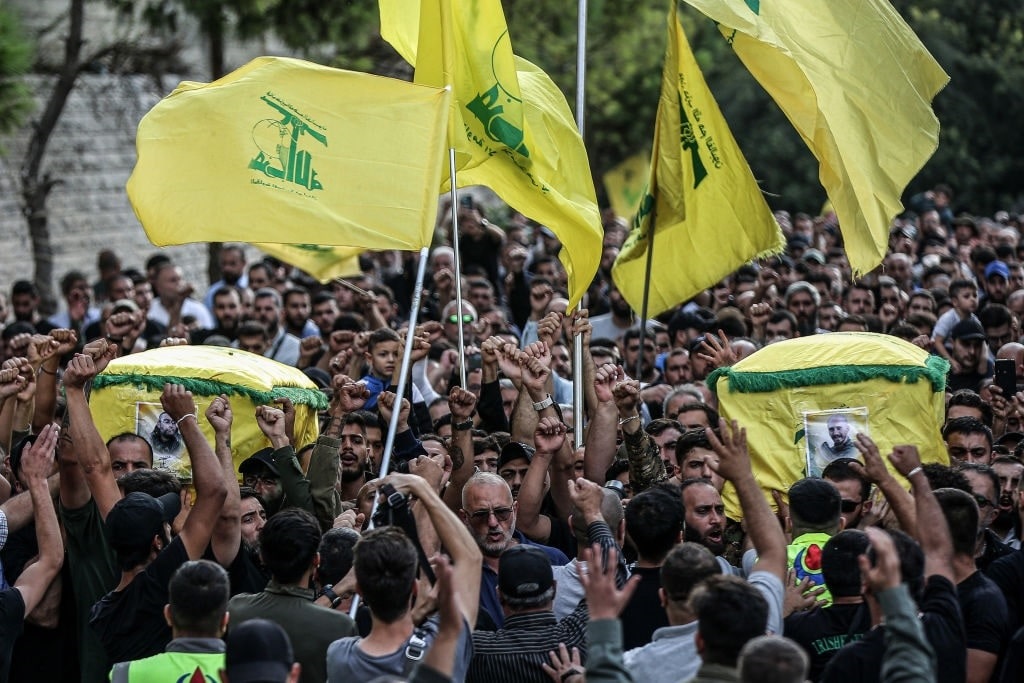The Biden administration is moving a contingent of warships to the Eastern Mediterranean in a measure of support for Israel as it battles Gaza-based terrorist group Hamas. Will two US Carrier Strike Groups (CSG), headed by the aircraft carriers USS Gerald R. Ford and USS Dwight D. Eisenhower, be enough to dissuade Lebanese Islamist group Hezbollah and its patron Iran from heating up the conflict even further?
Once Hamas launched its surprise assault, Hezbollah joined the fray and its attacks in northern Israel have since intensified. This is troubling because, according to reports, Hezbollah has about 100,000 reasonably well-trained jihadist fighters and more than 100,000 missiles and rockets, many of which are more precise than those used by Hamas. Furthermore, like Hamas, Hezbollah fighters are embedded in the local populace throughout southern Lebanon, making them difficult to root out. Artillery and mortar fire exchanged by Israel and Hezbollah cannot help but endanger civilians.
To make matters worse, Iran is rattling its sword, really just a dagger, at the United States with a warning not to support an Israeli ground attack against Hamas in Gaza. According to Liberty Nation’s James Fite, Iran’s Foreign Minister Hossein Amir-Abdollahian discussed with the UN’s envoy to the Middle East his nation’s position on Gaza, saying “that while Iran doesn’t want the fight between Israel and Hamas to spread throughout the region, it would be forced to step in and defend Gaza if the IDF (Israel Defense Force) launches its ground assault.”
US Show of Force Designed to Deter Hezbollah
To deter Iran from such escapades and its puppet Hezbollah from creating more havoc and possibly opening a northern front, the Biden administration moved the USS Gerald R. Ford CSG into the Eastern Mediterranean. However, the deterrence value of this show of force is uncertain. The threat from Lebanese Hezbollah grows, and the prospect of a second front opening has become, as the defense pundits like to say, “existential.” In its new coverage of Iran and the Israeli struggle against the Hamas terrorists and Hezbollah, the Institute for the Study of War (ISW), in collaboration with the American Enterprise’s Critical Threats Project (CTP), published an “Iran Update, October 16, 2023,” which explained:
“CTP-ISW recorded one mortar attack into Israeli territory from Lebanon, a decrease compared to seven recorded on October 15. The IDF said that there were multiple small arms clashes on Israel’s northern border. CTP-ISW also recorded one small arms clash between LH [Lebanese Hezbollah] and Israeli security forces across Israel’s northern border on October 16. LH released a video on October 16 showing LH militants shooting at Israeli surveillance equipment on the Lebanese border. LH members were seen shooting at Israeli Army radio towers and cameras at outposts along the Israel-Lebanon border.”

(Photo by Doaa Albaz/Anadolu via Getty Images)
According to Reuters reporting, on Oct. 15, at least one Israeli was killed and three wounded in a Hezbollah missile attack against a small farming community in northern Israel. The deadly skirmishes caused Israel’s Ministry of Defense to evacuate its citizens from towns in the area. The precautions taken by the IDF appear to be warranted, as things grow more violent on the Israel-Lebanon border.
Iran is stirring the pot of brinkmanship with its threatening rhetoric. “Conferred with my counterparts … Underlined the need to immediately stop Zionist crimes & murder in Gaza & to dispatch humanitarian aid. I stressed that time is running out for political solution; probable spread of war in other fronts is approaching unavoidable stage,” Iran’s foreign minister posted on X, formerly Twitter. The threat is as disingenuous as it is bold. Iran has significant control over its surrogate fighters in Hezbollah and Hamas. Many believe, with substantial evidence, that Iran was deeply involved in the Oct. 7 surprise attack by Hamas terrorists on Israel. Additionally, observers believe Tehran directly supports Hezbollah’s attacks. “Israel’s military is accusing Iran Monday of orchestrating attacks by the militant group Hezbollah along the Lebanon-Israel border over the weekend,” Fox News’ Greg Norman explained.
Hezbollah May Not Want Larger War With Israel

Hezbollah (Photo by Marwan Naamani/picture alliance via Getty Images)
Tehran’s bluster notwithstanding, many believe Hezbollah opening a second front would be disastrous for the terrorist organization. It may be satisfied with periodic and annoying attacks that split the IDF’s attention from its ground assault into Gaza. “Hezbollah appears to have calculated that the kinds of attacks it has carried out so far are enough to show solidarity with Hamas, but not enough to provoke a large-scale response by Israel, according to an Israeli defense official,” The New York Times reported.
With an American carrier strike group in the Mediterranean, off the coasts of Lebanon and Israel, and another armada, the USS Dwight D. Eisenhower CSG, on the way, perhaps Iran and its client organizations will think twice before expanding the conflict currently confined to Israel, Gaza, and, to a lesser extent, southern Lebanon. Whether the Biden administration’s show of force will be compelling depends on US credibility regarding whether it will use that power if needed.




